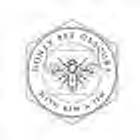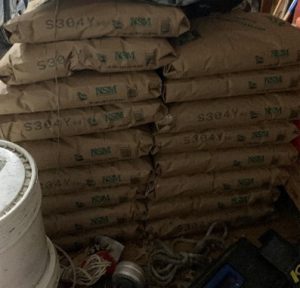By: James E. Tew
A cold, steady rain is coming down:
It’s May 9th in Northeast Ohio. Maple blooms – long gone. This season’s fruit bloom has come and gone. My bees are currently in a dearth. They are awaiting the next phase of the annual nectar/pollen flow that will come in a few days from sources like tulip poplar and clover. If the weather breaks, my bees will try to stay busy with some residual meager blooms and maybe rob their neighbors’ resources a bit. Until then, if you’re a bee forager, there’s not much to be done just now. Stand by. At this very moment, a cold rain is falling. It’s cold enough that frozen slush is accumulating on my truck windshield above the windshield wipers. I have packages and queens partially installed. The bees are out, but I still have the queens confined. I’m worried. It’s that worrying time of the year. Erratic Spring weather is typically worrying weather.
Worrying is a component of beekeeping:
Oh, so often, beekeepers are sold a bill-of-goods in beekeeping. Practicing the craft is “relaxing” and “rewarding”. We are told that it’s fulfilling. I should envision blue skies, gentle bees – with absolutely no inclination to swarm – flying contentedly to rewarding floral sources from which they will gather nectar to make delectable honey crops. In carefree fashion, I will extract this crop – without regard to 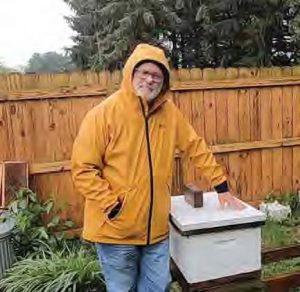 messiness and stickiness – and bottle it in attractive containers. Without even more regard to income, expense, or labor, I will then give my honey to deserving individuals, who will say, “Oh…you’re a beekeeper!?” I will humbly drop my head and reply, “Yes, I am a beekeeping practitioner of this noble craft.” Nowhere in my idyllic story did I mention expensive bee packages with confined queens on minimal honey stores in bee boxes that are sitting out in freezing rain.
messiness and stickiness – and bottle it in attractive containers. Without even more regard to income, expense, or labor, I will then give my honey to deserving individuals, who will say, “Oh…you’re a beekeeper!?” I will humbly drop my head and reply, “Yes, I am a beekeeping practitioner of this noble craft.” Nowhere in my idyllic story did I mention expensive bee packages with confined queens on minimal honey stores in bee boxes that are sitting out in freezing rain.
My beekeeping appreciation is not diminished:
I am not complaining about beekeeping. All those years ago, if I was sold a bill-of-goods, it was because I wanted to make the purchase. In oh-so-many ways, worrying puts a value on the decisions I make in my beekeeping enterprise. If this was an easy process – if we won every time – everyone would be beekeepers. So, when I do something right, it makes the decision-making event sweet and rewarding. But writing that statement does not mean that I am not concerned about the future of these packages that are back there right now – in freezing rain. I’m worried about them. Absolutely.
My worry last year:
I hope you don’t recall this memory, but exactly this time last season, I was worrying about my packages – just exactly as I am now. At that time, I wrote about it. But last season my worry was whether or not I could/should feed old honey from my Winter dead-outs back to my packages. I had a goodly amount of sullied honey that I did not feel was fit for my consumption, but I wondered if the bees might want it. Yes, they did. I wrote about the success of those packages building up on that old, dark honey. The packages grew into behemoth colonies. They became too tall. They were difficult to treat for mites. I never saw the queen, but thankfully I had little reason to search for her. The hives were crazy heavy. When I worked them, bees matted and festooned everywhere. Heavy smoke was always required. They were not enjoyable to work. I stopped worrying about old honey and shifted to worrying about managing large colonies. I worried about swarms departing from these mutants. I worried that these big bee boxes would disconcert my neighbors. I worried. I worried, but honestly, what beautiful challenges those beehives were. Last Winter came and went. It was nothing exceptional, but it was a typical Winter dearth. My beautiful colonies experienced the typical Winter colony die-off. I worried and I wondered if I would have any survivors. From my perspective, in my apiary, at this time in my life, I could not say that these oversized colonies succeeded any better than a typical two-deep colony. I am not suggesting anything about your situation. Could I write that sometimes big colonies can lead to big disappointments?
My personal take from that experience:
My personal take from that experience, and my take alone, was that (1) yes, within reason, I could feed ugly, old honey, in combs, to package bees. The bees did a beautiful job of refurbishing that honey and making new bees from it. I was judicious. I only put three of four frames of needy honey in the hive at one time. I tried not to overwhelm the three-pounds of bees doing the restoration work. My second observation (2), for me, was that huge colonies (3 deeps and two or three supers) did not fare any better that typical colonies. I’m not going to do that huge colony thing this season. I would rather have a few smaller colonies that I can manage more efficiently.
At this point, it is important for me to say that I am not the youthful beekeeper I once was. Smaller, more manageable colonies fit me better now. Years ago, I would have been much more in love with these larger units – but that’s just me.
A dead package queen:
Last season, one of my package queens was dead in the cage. The fairness of whether or not to replace such a queen is the stuff of another article topic. In my case, due to the distance to the provider and the policy of the provider, she would not be replaced. That may or may not be fair, but again we can discuss this some other time. The fact was that I had to deal with a queenless package. I simply combined the queenless package with a queenright package. As you would expect that double-package colony exploded. Later in the season, when I could get a queen, I divided the big colony into halves, and all ended (mostly) happily.
Now, too many queens:
Please hang in there – I’m going somewhere with this queen thread. This year, with the memory of last year still fresh, I picked up two extra queens. “I can always use them,” I said to myself. When I said that to myself, I had that idyllic view in mind that I discussed above. I did not picture long periods of rain and late season cold weather. I should have. Something like this happens every season. Now nearly 10 days later, I still have those queens in cages. I’m storing them in one of the package colonies. Of course, I worry about them.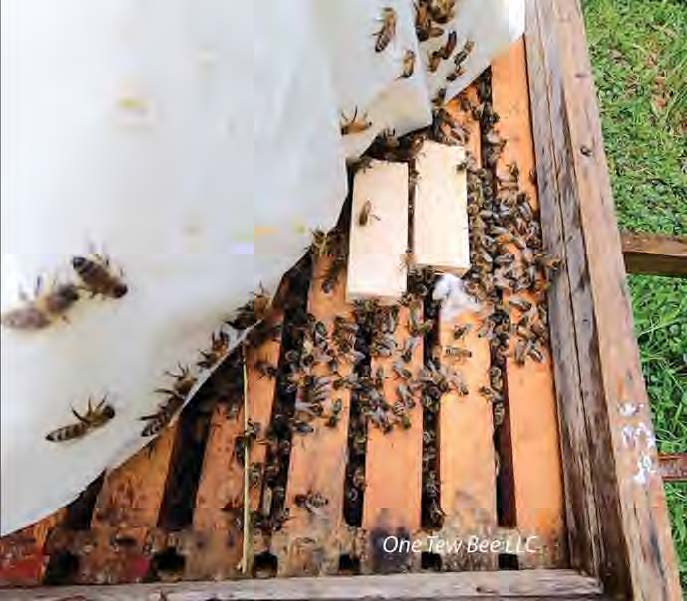 Years ago, when I raised my own queens and they were plentiful and cheap, I kept several queens in cages for nearly six weeks. Occasionally, I changed out the workers and fed fresh sugar candy along with an occasional drop of water. Though I knew the queens would not go forever, when they died, I was bummed. So, I know queens can be caged for long periods, but it can’t be good for them. That dead package queen has made me see that – for me – buying extra queens for early season use is not a great idea. If the early Spring weather is uncooperative, extra queens are hard to get into splits. If I have package queen issues, it seems to work best for me to combine the queenless packages, build that colony up, and then split it a few weeks from now when the season is dependable, and queens are a bit more readily available. What makes this work, for me, as well as it does, is that I still have abundant stores of comb honey that I can use to pump up the colonies. Well, “not to worry.” One day, when I do not have this extra honey, I can still feed sugar syrup and accomplish the same goal.
Years ago, when I raised my own queens and they were plentiful and cheap, I kept several queens in cages for nearly six weeks. Occasionally, I changed out the workers and fed fresh sugar candy along with an occasional drop of water. Though I knew the queens would not go forever, when they died, I was bummed. So, I know queens can be caged for long periods, but it can’t be good for them. That dead package queen has made me see that – for me – buying extra queens for early season use is not a great idea. If the early Spring weather is uncooperative, extra queens are hard to get into splits. If I have package queen issues, it seems to work best for me to combine the queenless packages, build that colony up, and then split it a few weeks from now when the season is dependable, and queens are a bit more readily available. What makes this work, for me, as well as it does, is that I still have abundant stores of comb honey that I can use to pump up the colonies. Well, “not to worry.” One day, when I do not have this extra honey, I can still feed sugar syrup and accomplish the same goal.
It’s not just springtime packages:
Our bees are not unlike our children. There’s always plenty of new things about which we can worry. In a few short weeks, I will probably be worrying about swarms. Or I will be worrying (again) about my neighbors. Or are the colonies ready for Winter. Should I treat for mites again? There is always something.
Swarms:
I constantly tell others that we can try to control swarming, but we are going to ultimately fail. Bee swarms are a bee fact of life. That is oh so easy for me to write, but when that swarm is issuing and I am on the scene, am I worried or am I excited or am I both? Do something, Jim! I will even consider tanging the swarm (that should alight some of you). In my case, the swarm is most likely going to pitch on a near neighbor’s property. “Here we go again.” Several years ago, I had to ask my tolerant neighbor to stop his mowing in order for me to see if I could recapture a recalcitrant swarm. They kept going and all I accomplished was disrupting my neighbor’s schedule. Having done that, I worry that it will happen again.
Times that I should have worried:
Anytime – and I do mean any time – that I have full colonies confined and loaded on a truck, traveling down the road, I worry. Even when things work beautifully, I worry. Many years ago, an outer cover became unattached, flew from the hive, sailed into the neighboring lane, and struck the grill of a car that was passing me. I had to stop and talk to the discombobulated driver. Standing by the road that day was not a good time for a lecture on the value of insect pollination. If I live for hundreds of years to come, I will not forget that experience. (Just so you know, all ended well. No damage was done, and the other driver went on his way. However, I seriously doubt that he became a beekeeper.)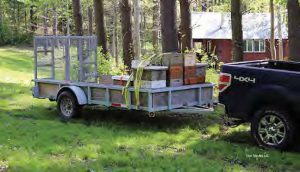 On a late Winter, cold morning, I loaded six colonies of bees on an open trailer and hauled them 50 miles to a state bee meeting. The ambient temperature was below freezing. Upon arrival at the meeting, I discovered that I caused the confined colonies to overheat and suffocate. They were all dead. Egad, it was below freezing. Driving to the meeting that day, my concern was that the outer covers should not blow off. I had no idea that I was worrying about the wrong thing. At another property, at another time, yet another neighbor came over and saw two colonies I had there. He said, “Oh, I didn’t know you had bees back here.” He and I were standing in the colonies’ flight path and I worried that he would be stung. Even as I was having that very thought, a bee needlessly stung him just under his right eye. I can only write that I was aghast. I was right to worry. I should have worried more. I should have responded to my worry. Worrying is not a bad thing.
On a late Winter, cold morning, I loaded six colonies of bees on an open trailer and hauled them 50 miles to a state bee meeting. The ambient temperature was below freezing. Upon arrival at the meeting, I discovered that I caused the confined colonies to overheat and suffocate. They were all dead. Egad, it was below freezing. Driving to the meeting that day, my concern was that the outer covers should not blow off. I had no idea that I was worrying about the wrong thing. At another property, at another time, yet another neighbor came over and saw two colonies I had there. He said, “Oh, I didn’t know you had bees back here.” He and I were standing in the colonies’ flight path and I worried that he would be stung. Even as I was having that very thought, a bee needlessly stung him just under his right eye. I can only write that I was aghast. I was right to worry. I should have worried more. I should have responded to my worry. Worrying is not a bad thing.
When is the best time to worry?
I seem to do my best worrying about 11:00 PM. The day is done. I am quieted and I have time to think. Is the cluster covering those queen cages? Did I leave enough honey frames in those new colonies? Will they swarm tomorrow? Did that last mite treatment work? Did I release the queens too soon? Do I have too many colonies in my home yard? But readers, I ask, are you and I truly worrying or are we just reviewing our management decisions? Like so many other things in life, bee colony management is not an exact procedure. We do our best. We strive to always win more than we lose. Just ask your computer thesaurus for alternatives to “worry”. Stunning number of choices. Is “worry” always the best term for what we are feeling? Maybe we are just second guessing.
It’s okay:
Go ahead. Worry about your bees. Second guess your decisions. It’s how we grow in our craft. It’s how we help others grow. Fretting helps us stay on the management path when the way is unclear.
Thank you:
If you wrote me and I did not respond, please know that I am sorry and I truly appreciate you taking time to write. It was not because I did not care. If you subscribed to my YouTube channel and I did not tell you I appreciated your decision, I apologize. I meant to, but I just did not get to it. If we are friends on Facebook and I have not responded to your message, it was never a personal affront. If you have listened to some of Kim Flottum and my podcasts, I thank you for that. We need listeners. If you read this article, I especially thank you. I appreciate the privilege of being able to work beyond my retirement. Without an audience, I have no reason. Thank you.
Dr. James E. Tew, Emeritus Faculty, Entomology, The Ohio State University and, One Tew Bee, LLC; tewbee2@gmail.com; http://www.onetew.com
